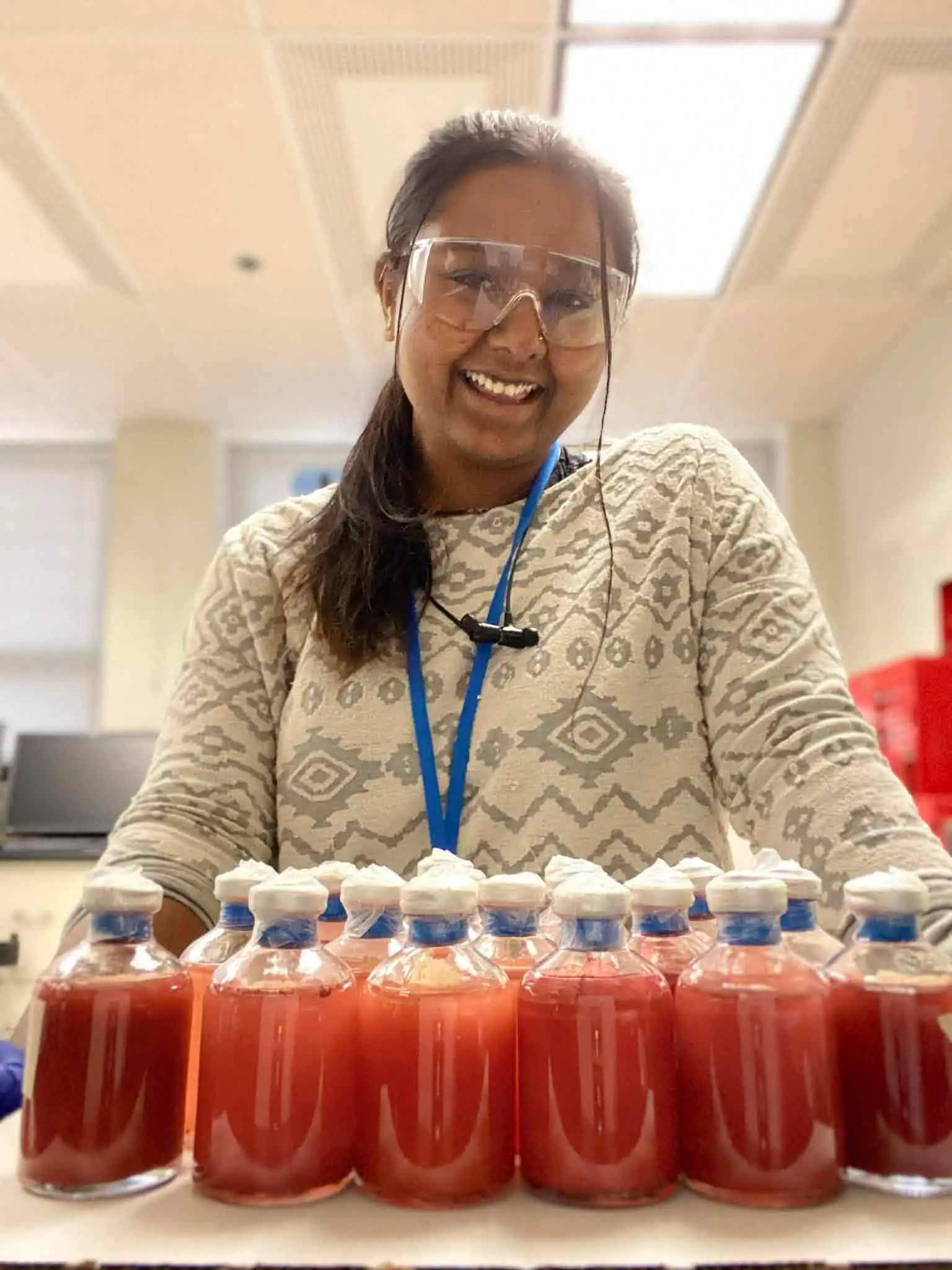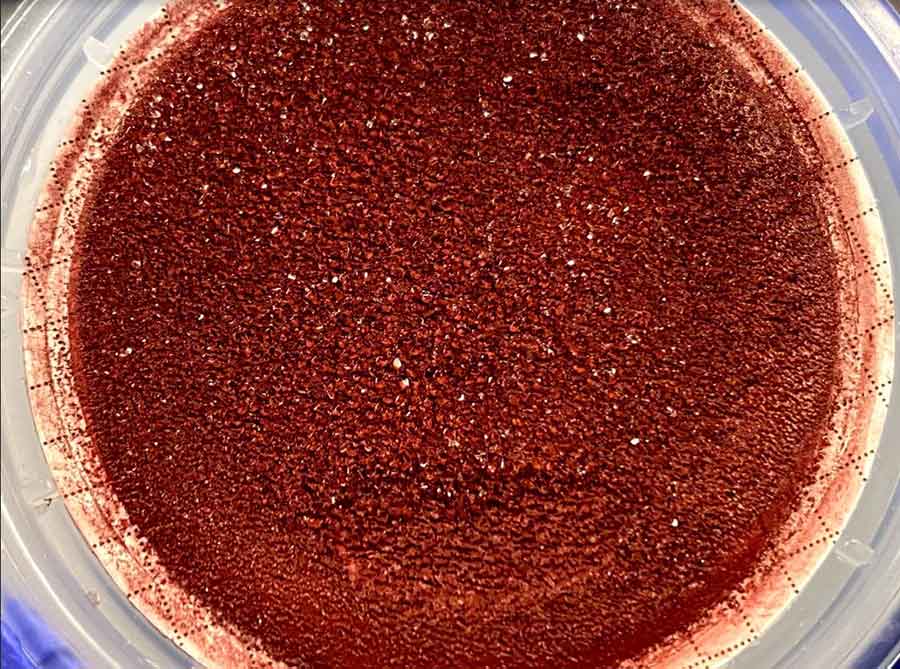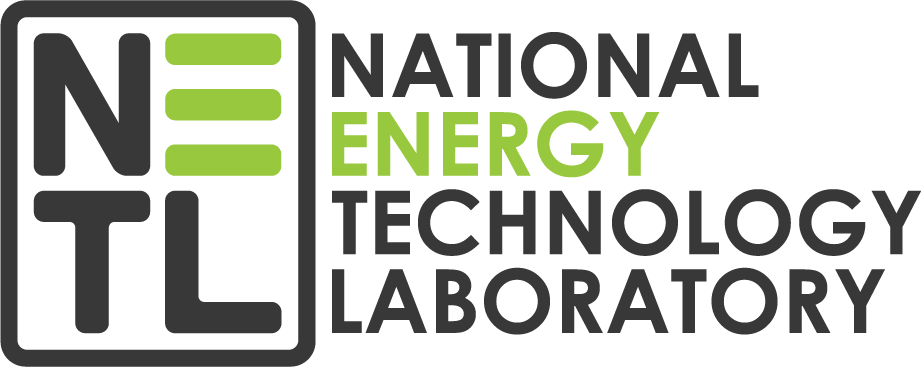NETL participant studies microorganisms for use in FGD wastewater treatment
Meet Preom Sarkar
From an early age, Preom Sarkar was instilled with the importance of hard work and persistence. Her parents, two immigrants from Bangladesh, emphasized the value of a good education and encouraged her interests in math and science. With their support, Sarkar decided to pursue a career in bioengineering.

Preom Sarkar conducted research on biological treatments of flue gas desulfurization (FGD) systems as part of the National Energy Technology Laboratory (NETL) Postgraduate Research Program (PGRP).
As an undergraduate, Sarkar attended Lehigh University and spent time exploring different applications of bioengineering. Following her junior year, she was selected for the Iacocca International Internship Program and traveled to Nagoya, Japan. There she spent two months studying the ongoing biodiversity and reforestation efforts in Kaisho forest, and discovered her passion for using bioengineering to positively impact environmental systems. As a result, she decided to focus her future career efforts on using bioengineering to solve some of the world’s environmental issues.
Sarkar went on to pursue her master’s degree in environmental engineering with a focus in water sustainability at Carnegie Mellon University. After graduating in 2019, she began honing her research and laboratory skills as part of the National Energy Technology Laboratory (NETL) Postgraduate Research Program (PGRP). The program grants students the opportunity to network with world-class scientists using state-of-the-art equipment and gives them a chance to develop their skills in a practical, hands-on environment.
For her appointment, Sarkar was part of the geomicrobiology and geochemistry group at NETL in Pittsburgh, Pennsylvania. Under the guidance of her mentor, Djuna Gulliver, Ph.D., Sarkar conducted research on water management of power systems, with a specific focus on biological treatment of flue gas desulfurization (FGD) systems.
FGD systems play an important role in mitigating air pollution caused by coal-fired power plants. These systems are used to scrub the gas released during the coal combustion process in order to mitigate the release of harmful sulfur oxide gasses into the atmosphere. However, as a result of scrubbing, a complex wastewater is formed containing contaminants that must be treated before the water is released into the environment. The wastewater contaminants are regulated under the Environmental Protection Agency’s (EPA) Effluent Limitation Guideline Rule – one such contaminant in this ruling is chemical element selenium.
Selenium is of interest because it can cause detrimental ecological consequences at small amounts. Selenium species can be soluble in water and are therefore more bioavailable for accidental uptake by organisms. If this uptake occurs, selenium can travel up the food chain and affect humans negatively. But while selenium is detrimental to many organisms, some microbial life is able to utilize soluble selenium and transform it into solid selenium. Sarkar’s project studied the organisms that are native to FGD system wastewater and are able to perform this transformation.
“The goal of my research is to enrich, identify and characterize these microorganisms,” said Sarkar. “Knowing more about them can help us optimize biological selenium treatment strategies so that we can have clean water even when we use coal.”
Sarkar’s research offers many positive potential impacts for the environment. Being able to biologically remediate wastewater could lead to cleaner water sources, mitigate ecological harm and allow for an avenue for “clean coal”. As coal is the largest source of electricity globally, finding sustainable methods to reduce harmful byproducts is an important step toward reducing the environmental damage it can cause.
“I believe that nature has already provided us the solutions to solve some of the world’s climate issues,” said Sarkar. “Microbial life plays a big part in major biogeochemical cycles, so it is important to study them for their many applications such as energy, remediation, food production and health.”

A filter cake of cultured anaerobic microorganisms and elemental selenium after incubation period, used for DNA extraction and SEM imaging.
Throughout her appointment, Sarkar learned a plethora of new laboratory skills. She gained experience handling low biomass samples, conducting DNA extraction and sequencing and performing various analysis and culturing experiments. She is grateful for the opportunities she had to grow as a researcher and engineer, and strongly recommends the NETL program to anyone interested in gaining hands-on laboratory experience.
“I consider myself lucky to have been in an ORISE fellowship during the global pandemic,” Sarkar said.
“My laboratory time was significantly cut in the beginning which threw me for a curve ball, but it ultimately taught me how to adapt my experimental planning for the unexpected and allowed me to grow my patience. My fellowship helped me refine many of the techniques I learned in my undergraduate career as well as gain and master new techniques.”
Following the conclusion of her appointment in August 2021, Sarkar began pursuing her doctoral degree in environmental engineering at Carnegie Mellon University. When she graduates, she hopes to either continue doing meaningful and impactful work for the government or pursue an industry career that allows her to make a positive difference in the world.
The NETL internship programs are administered by the Oak Ridge Institute for Science and Education (ORISE) for the U.S. Department of Energy (DOE). ORISE is managed for DOE by Oak Ridge Associated Universities (ORAU).


